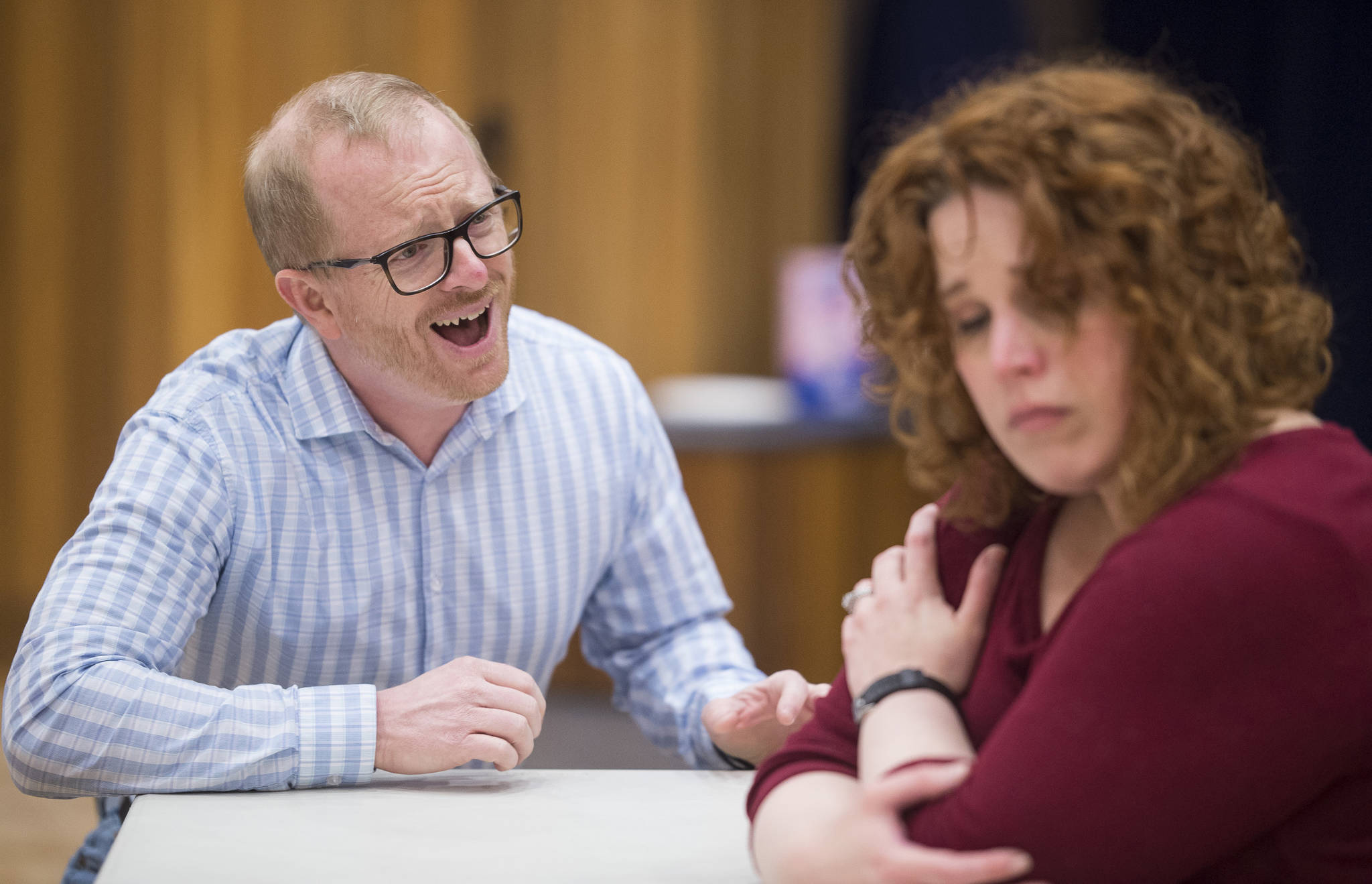Suburban motherhood and mental illness might not seem to go hand-in-hand at first blush. But Juneau Douglas Little Theatre’s upcoming musical “Next to Normal” throws into sharp relief what is, for some, a part of everyday life. It follows Diana Goodman, a mother who struggles with bipolar disorder and depression, as she battles her illnesses and attempts to balance her own fears and desires with those of her family. The musical tackles difficult subject matters such as grief, drug abuse, and suicide with brutal honesty, humor, and rock music.
Diana, played by Margeaux Ljungburg, is quick-witted and sharp despite her growing mental instability. Her husband Dan, played by Chris Murray, is earnestly in love with her despite feeling run-down from trying to care for her. Their children Natalie and Gabe, played by Ashleigh Watt and Richard Carter, are the center of their lives, or would be if it weren’t for Diana’s worsening disorders. Cole Mitchell plays Henry, Natalie’s stoned but sweet boyfriend, and Zebadiah Bodine portrays a rock star psychiatrist. It’s a normal family in an abnormal situation.
Margeaux Ljungberg, who has performed in a number of Perseverance Theater productions and most recently in “The Vibrator Play,” tries to bring realness to the character of Diana. It’s been a challenge, she said, to keep her portrayal believable when she is switching from screaming to crying on a dime.
“But it’s been fun and I’m certainly wanting to do it with some level of sensitivity in case someone who comes to see the show can relate to this, because I think it is a really relatable story. Not everyone is officially diagnosed but I think a lot of us have had someone in our life where we can see the Diana-isms in them. Or the Dan-isms, really, being that enabler,” she said, referencing her on-stage husband’s less-obvious dysfunction.
While Dan’s problems aren’t medicated like Diana’s, he still struggles with his own depression and with the issues he faces as the primary emotional support for his wife. His character sheds light on another side of mental illness: the emotional toll it takes on caregivers with no support systems of their own.
About how this toll affects Dan’s ability to care for his wife, Ljungberg said, “His level of support isn’t always exactly what she needs and I think that sometimes it keeps her stuck. And it keeps the family stuck in a repetitious pattern that doesn’t really move anything forward because everyone just wants to hide it and push it to the side.”
Ultimately, she said, Diana has to find her own way through a broken mental health system and do what she feels is right for herself and her family.
“It’s about a family that isn’t perfect and the ending isn’t perfect. It’s not going to be like Oklahoma where everyone ends up happy and married.”
Director Julia O’Connor, who has assistant-directed several Perseverance Theater shows and “West Side Story” through the Orpheus Project and Juneau Dance Theatre, agreed that the play is primarily about a family. She had seen it on Broadway almost 10 years ago and it stayed with her.
“It was such a serious and topical play and it was so different from what I’ve ever seen… it stuck in my mind and last year when Haley Duran (‘Next to Normal’ choreographer) and I were talking about what plays we wanted to do together after ‘West Side Story,’ this just was in my mind.”
O’Connor said that the play fit perfectly within her parameters due to the small cast and the typical Juneau audience’s ability to “get it” when it comes to stories about mental illness.
“It’s a smart audience here,” she said.
Directing “Next to Normal” came with a unique set of challenges, but the largest one was avoiding stereotypes. She said that, while she keeps the aspects of bipolar disorder and depression in mind when directing the actors, she is careful not to focus on them so that the characters remain people instead of diagnoses.
“It’s a relatable play,” she said. “You’re rooting for each character in one way or another. There’s not really a true villain.”
To continue the conversation about mental health in the context of the Juneau community, JDLT invited the Juneau Alliance for Mental Health, Inc. (JAMHI) to participate in after-show talks. Rachel Gearhart, the clinical director for JAMHI, said that she and several of her colleagues would be providing a platform for people to ask questions and to find local resources.
“I’m hoping to have a discussion that allows people to ask any questions that they might have about how to access resources in town, how to support people in their lives who might be experiencing mental health (issues), and reduce stigma overall because I think the more we can talk about it openly, (that) is what helps people feel like they can get help. And so whether it’s for themselves or somebody else, being able to just talk about it, about what’s normal, what’s not normal, what does mental health look like, using the right terminology, any of that would be what I hope for.”
Gearhart, will be joined by Doug Harris, the chief integrated services officer of JAMHI, and a staff member who works with case managers in leading these talks.
She expressed optimism about the talks and said, “There’s plenty of resources and we’re excited to be a part of the conversation.”
Performance dates for “Next to Normal” are March 9, 10, 15, 16, 17 at 7:30 p.m., and March 11, 18 at 2 p.m. There will be a pay-as-you-can dress rehearsal on March 8, 7:30 p.m. All performances will be at McPhetre’s Hall.
• Jack Scholz is the Capital City Weekly intern and is playing percussion for “Next to Normal.”

